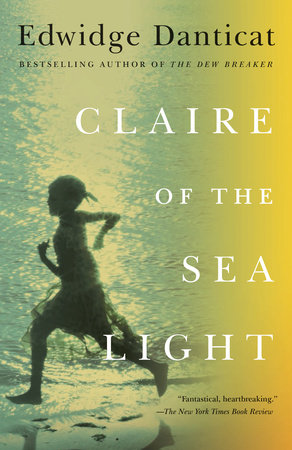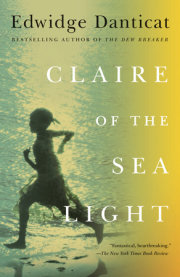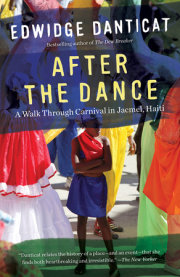Part One
Claire of the Sea Light
The morning Claire Limyè Lanmè Faustin turned seven, a freak wave, measuring between ten and twelve feet high, was seen in the ocean outside of Ville Rose. Claire’s father, Nozias, a fisherman, was one of many who saw it in the distance as he walked toward his sloop. He first heard a low rumbling, like that of distant thunder, then saw a wall of water rise from the depths of the ocean, a giant blue-green tongue, trying, it seemed, to lick a pink sky.
Just as quickly as it had swelled, the wave cracked. Its barrel collapsed, pummeling a cutter called
Fifine, sinking it and Caleb, the sole fisherman onboard.
Nozias ran to the edge of the water, wading in to where the tide reached his knees. Lost now was a good friend, whom Nozias had greeted for years as they walked past each other, before dawn, on their way out to sea.
A dozen or so other fishermen were already standing next to Nozias. He looked down the beach at Caleb’s shack, where Caleb’s wife, Fifine—Josephine—had probably returned to bed after seeing him off. Nozias knew from his experience, and could sense it in his bones, that both Caleb and the boat were gone. They might wash up in a day or two, or more likely they never would.
It was a sweltering Saturday morning in the first week of May. Nozias had slept in longer than usual, contemplating the impossible decision he’d always known that he would one day have to make: to whom, finally, to give his daughter.
“Woke up earlier and I would have been there,” he ran back home and tearfully told his little girl.
Claire was still lying on a cot in their single-room shack. The back of her thin nightdress was soaked with sweat. She wrapped her long, molasses-colored arms around Nozias’s neck, just as she had when she was even littler, pressing her nose against his cheek. Some years before, Nozias had told her what had happened on her first day on earth, that giving birth to her, her mother had died. So her birthday was also a day of death, and the freak wave and the dead fisherman proved that it had never ceased to be.
The day Claire Limyè Lanmè turned six was also the day Ville Rose’s undertaker, Albert Vincent, was inaugurated as the new mayor. He kept both positions, leading to all kinds of jokes about the town eventually becoming a cemetery so he could get more clients. Albert was a man of unmatched elegance, even though he had shaky hands. He wore a beige two-piece suit every day, just as he did on the day of his inauguration. His eyes, people said, had not always been the lavender color that they were now. Their clouding, sad but gorgeous, was owing to the sun and early-onset cataracts. On the day of his swearing-in, Albert, shaking hands and all, recited from memory a speech about the town’s history. He did this from the top step of the town hall, a white nineteenth century gingerbread that overlooked a flamboyant-filled piazza, where hundreds of residents stood elbow to elbow in the afternoon sun.
Ville Rose was home to about eleven thousand people, five percent of them wealthy or comfortable. The rest were poor, some dirt-poor. Many were out of work, but some were farmers or fishermen (some both) or seasonal sugarcane workers. Twenty miles south of the capital and crammed between a stretch of the most unpredictable waters of the Caribbean Sea and an eroded Haitian mountain range, the town had a flower-shaped perimeter that, from the mountains, looked like the unfurling petals of a massive tropical rose, so the major road connecting the town to the sea became the stem and was called Avenue Pied Rose or Stem Rose Avenue, with its many alleys and capillaries being called épines, or thorns.
Albert Vincent’s victory rally was held at the town’s center—the ovule of the rose—across from Sainte Rose de Lima Cathedral, which had been repainted a deeper lilac for the inauguration. Albert offered his inaugural address while covering his hands with a black fedora that few had ever seen on his head. On the edge of the crowd, perched on Nozias’s shoulder, Claire Limyè Lanmè was wearing her pink muslin birthday dress, her plaited hair covered with tiny bow shaped barrettes. At some point, Claire noticed that she and her father were standing next to a plump woman with a cherubic face framed with a long, straight hairpiece. The woman was wearing black pants and a black blouse and had a white hibiscus pinned behind her ear. She owned Ville Rose’s only fabric shop.
“Thank you for putting your trust in me,” Albert Vincent now boomed into the crowd. The speech was at last winding down nearly a half hour after he’d begun speaking.
Nozias cupped his hands over his mouth as he whispered something in the fabric vendor’s ear. It was obvious to Claire that her father had not really come to hear the mayor, but to see the fabric vendor.
Later that same evening, the fabric vendor appeared at the shack near the end of Pied Rose Avenue. Claire was expecting to be sent to a neighbor while the fabric vendor stayed alone with her father, but Nozias had insisted that Claire pat her hair down with an old bristle brush and that she straighten out the creases on the ruffled dress that she’d kept on all day despite the heat and sun.
Standing between Nozias’s and Claire’s cots in the middle of the shack, the fabric vendor asked Claire to twirl by the light of the kerosene lamp, which was in its usual place on the small table where Claire and Nozias sometimes ate their meals. The walls of the shack were covered with flaking, yellowed copies of
La Rosette, the town’s newspaper, which had been glued to the wood long ago with manioc paste by Claire’s mother. From where she was standing, Claire could see her own stretched-out shadow moving along with the others over the fading words. While twirling for the lady, Claire heard her father say, “I am for correcting children, but I am not for whipping.” He looked down at Claire and paused. His voice cracked, and he jabbed his thumb into the middle of his palm as he continued. “I am for keeping her clean, as you can see. She should of course continue with her schooling, be brought as soon as possible to a doctor when she is sick.” Still jabbing at his palm, after having now switched palms, he added, “In turn, she would help with some cleaning both at home and at the shop.” Only then did Claire realize who this “her” was that they were talking about, and that her father was trying to give her away.
Her legs suddenly felt like lead, and she stopped twirling, and as soon as she stopped, the fabric vendor turned to her father, her fake hair blocking half of her face. Nozias’s eyes dropped from the fabric vendor’s fancy hairpiece to her pricey open-toed sandals and red toenails.
“Not tonight,” the fabric vendor said, as she headed for the narrow doorway.
Nozias seemed stunned, drawing a long breath and letting it out slowly before following the fabric vendor to the door. They thought they were whispering, but Claire could hear them clearly from across the room.
“I’m going away,” Nozias said. “Pou chèche lavi, to look for a better life.”
“Ohmm.” The fabric vendor groaned a warning, like an impossible word, a word she had no idea how to say. “Why would you want your child to be my servant, a restavèk?”
“I know she would never be that with you,” Nozias said. “But this is what would happen anyway, with less kind people than you if I die. I don’t have any more family here in town.”
Nozias put an end to the fabric vendor’s questioning by making a joke about the undertaker’s mayoral victory and how many meaningless speeches he would be forced to endure if he remained in Ville Rose. This made the fabric vendor’s jingly laugh sound as though it were coming out of her nose. The good news, Claire thought, was that her father did not try to give her away every day. Most of the time, he acted as though he would always keep her. During the week, Claire went to the École Ardin, where she received a charity scholarship from the schoolmaster himself, Msye Ardin. And at night, Claire would sit by the kerosene lamp at the small table in the middle of the shack and recite the new words she was learning. Nozias enjoyed the singsong and her hard work and missed it during her holidays from school. The rest of the time, he went out to sea at the crack of dawn and always came back with some cornmeal or eggs, which he’d bartered part of his early-morning catch for. He talked about going to work in construction or the fishing trade in the neighboring Dominican Republic, but he would always make it sound as though it were something he and Claire could do together, not something he’d have to abandon her to do. But as soon as her birthday came, he would begin talking about it again— chèche lavi: going away to make a better life.
Lapèch, fishing, was no longer as profitable as it had once been, she would hear him tell anyone who would listen. It was no longer like in the old days, when he and his friends would put a net in the water for an hour or so, then pull it out full of big, mature fish. Now they had to leave nets in for half a day or longer, and they would pull fish out of the sea that were so small that in the old days they would have been thrown back. But now you had to do with what you got; even if you knew deep in your gut that it was wrong, for example, to keep baby conch shells or lobsters full of eggs, you had no choice but to do it. You could no longer afford to fish in season, to let the sea replenish itself. You had to go out nearly every day, even on Fridays, and even as the seabed was disappearing, and the sea grass that used to nourish the fish was buried under silt and trash.
But he was not talking to the fabric vendor about fishing that night. They were talking about Claire. His relatives and his dead wife’s relatives, who lived in the villages in the surrounding mountains where he was born, were even poorer than he was, he was saying. If he died, sure they would take Claire, but only because they had no choice, because that’s what families do, because no matter what, fòk nou voye je youn sou lòt. We must all look after one another. But he was being careful, he said. He didn’t want to leave something as crucial as his daughter’s future to chance.
After the fabric vendor left, colorful sparks rose up from the hills and filled the night sky over the homes near the lighthouse, in the Anthère (anther) section of town. Beyond the lighthouse, the hills turned into a mountain, wild and green, and mostly unexplored because the ferns there bore no fruit. The wood was too wet for charcoal and too unsteady for construction. People called this mountain Mòn Initil, or Useless Mountain, because there was little there that they wanted. It was also believed to be haunted.
The fireworks illuminated the mushroom-shaped tops of the ferns of Mòn Initil as well as the gated two-story mansions of Anthère Hill. They also illuminated the clapboard shacks by the sea and their thatched and tin roofs.
Once the fabric vendor was gone, Claire and her father rushed out to see the lights exploding in the sky. The alleys between the shacks were jam-packed with their neighbors. With cannonlike explosions, Albert Vincent, the undertaker turned mayor, was celebrating his victory. But as her neighbors clapped in celebration, Claire couldn’t help but feel like she was the one who’d won. The fabric vendor had said no and she would get to stay with her father another year.
Copyright © 2013 by Edwidge Danticat. All rights reserved. No part of this excerpt may be reproduced or reprinted without permission in writing from the publisher.




































































































